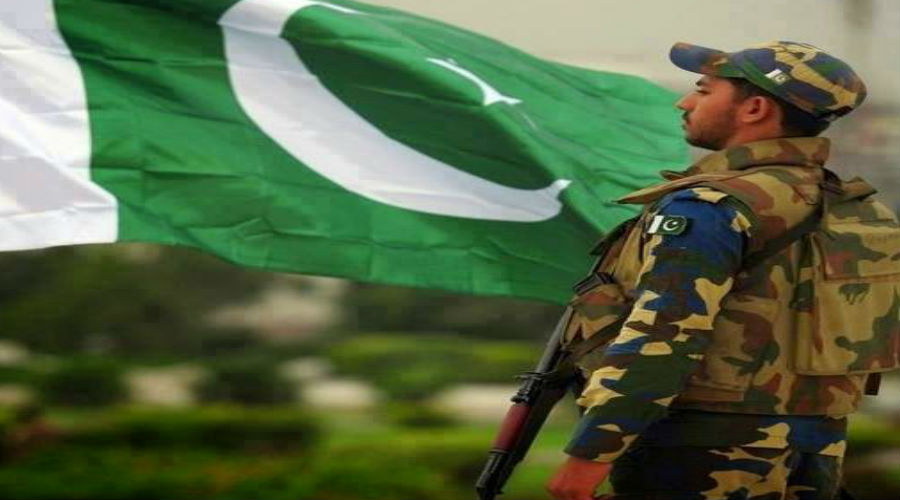Iran appears to be trying to repeat its experience of establishing paramilitary militias, which started after the fall of Reza Shah Pahlavi’s regime in 1979. Yet, this time it is in neighboring countries. On November 7 in Tehran, Commander of the Iranian Revolutionary Guards Corps (IRGC), Major General Mohammad Ali Jafari, urged the visiting Pakistani Chief of Army Staff, General Qamar Javed Bajwa to establish a Pakistani version of the Iranian Basij militia to back the regular army. He even said Iran was ready to offer its experience to the neighboring Pakistan, and showed off his country’s experience in Syria and Iraq. He further claimed that their previous experiences succeeded in achieving their goals. However, his assertion is not consistent with the realities on the ground, because Iranian-led militias have exacerbated regional crises and blocked efforts to reach settlements.
The IRGC plays the primary role of establishing and training militias in regional countries, while the official establishment, represented by the ministry of defense, assumes traditional missions such as promoting coordination with counterpart establishments in neighboring countries, such as Pakistan. In his other meetings in Tehran, Bajwa’s talks with Iranian minister of defense, Amir Hatami and Chief of Staff, Mohammad Bagheri, were focussed on ways of promoting military cooperation to enhance border control. Such cooperation will allow both countries to counter cross-border attacks carried out in Iran by Iranian armed groups against border guards and IRGC forces.
Primary Indications
Iran’s efforts indicate their aim to achieve two key goals. Firstly, it seeks to export its revolution and its products such as the Basij, which Tehran claims is a model to follow, to help promote the creation of parallel militia that back regular armies and can play military and political roles at home and abroad. Jafari justified his call to Pakistan by citing the missions being carried out by the Quds Force, the IRGC’s extraterritorial unit.
Secondly, Iran tries to institutionalize its constant intervention in neighboring countries, and supports Shi’ite Pakistani groups, in particular in border areas in north-west of Pakistan and the Punjab region. Some elements of these groups previously supported efforts to counter Taliban, while others joined militias, primarily the so-called Zaynabiyoun Brigade, created and trained by Iran to take part in the Syrian conflict.
Persistent Tensions
Interestingly, Jafari’s call went unheeded by the Pakistani Chief of Staff who has not responded with neither a comment, nor a statement. However, there are indications that can help get a picture of Pakistan’s position. Most importantly is Islamabad’s rejection of Iran’s intervention in its internal affairs, as well as Iranian frequent accusation of supporting some Iranian armed groups that sparked tensions between the two states. In May 2017, the Pakistani foreign ministry summoned the Iranian ambassador, Mehdi Honardoost, to protest a recent statement by Bagheri, who threatened to carry out cross border strikes inside Pakistan against the Jaish ul-Adl group accused by Iran of killing 10 Iranian border guards.
Conflicting Determinants
Although the political role of the Pakistani army is historically prominent, the role played by the army in Pakistan does not match the roles played by various branches of the Iranian military establishment. This can be explained in light of the following:
1- Different structures and creeds. In terms of structure and military creed, Pakistan’s army is a traditional regular army. Its structure does not allow the creation of any parallel entities that share powers and roles. It is neither allowed to have sectarian affiliations, although the army in Islamabad shows some religious manifestations.
2- Different missions for paramilitary forces. In Pakistan, the 304,000-strong paramilitary forces such as the Coast Guards or the Maritime Security Agency, estimated to account for nearly half of the 617,000-strong army, are more regular than militia-styled. They entail either rapid deployment, or elite forces. Some of these formations, such as the Frontier Corps, the Pakistan Rangers, are part of the ministry of interior. Other special units include are the National Cadet Corps and Women's Guard.
These components were created to achieve special goals, such as maintaining balance between various components of society and addressing chronic threats arising since the establishment of the state. Moreover, some of them, such as the Northern Light Infantry, were formed for certain terrains such as coastal or border areas. Overall, all are part of the conventional structure of a regular army.
3- Conventional Roles. Unlike Iran, Pakistan does not have experience in extraterritorial intervention, and its army’s presence outside the country's border is confined to conventional participation in joint trainings with other regular armies or in peacekeeping missions.
4- Opposition to Iran’s extraterritorial expansion. Pakistan considers Iran’s expansion, in crisis-hit countries in particular, as a threat to neighboring countries and a cause of upsetting existing regional balance of powers. Statements made by Iranian officials further revealed Tehran’s endeavor to support its regional expansions through establishing strong ties with terrorist organizations and armed groups operating in countries.
That said, it can possibly be concluded that there are obstacles blocking Iran from promoting its Basij model in some regional countries and Pakistan in particular. The obstacles will further hinder Iranian endeavors to seize its involvement in various regional conflicts, and play a role in increasing chaos, instability and supporting various terrorist organizations.


